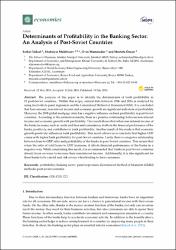| dc.contributor.author | Yüksel, Serhat | |
| dc.contributor.author | Mukhtarov, Shahriyar | |
| dc.contributor.author | Mammadov, Elvin | |
| dc.contributor.author | Özsarı, Mustafa | |
| dc.date.accessioned | 10.07.201910:49:13 | |
| dc.date.accessioned | 2019-07-10T19:50:13Z | |
| dc.date.available | 10.07.201910:49:13 | |
| dc.date.available | 2019-07-10T19:50:13Z | |
| dc.date.issued | 2018 | en_US |
| dc.identifier.citation | Yüksel, S., Mukhtarov, S., Mammadov, E. ve Özsari, M. (2018). Determinants of profitability in the banking sector: An analysis of post-Soviet countries. Journal of Economies, 6(3). https://dx.doi.org/10.3390/economies6030041 | en_US |
| dc.identifier.issn | 2227-7099 | |
| dc.identifier.uri | https://dx.doi.org/10.3390/economies6030041 | |
| dc.identifier.uri | https://hdl.handle.net/20.500.12511/1917 | |
| dc.description | WOS: 000448396900005 | en_US |
| dc.description.abstract | The purpose of this paper is to identify the determinants of bank profitability in 13 post-Soviet countries. Within this scope, annual data between 1996 and 2016 is analyzed by using fixed effects panel regression and the Generalized Method of Moments (GMM). It is concluded that loan amount, non-interest income and economic growth are significant indicators of profitability. Moreover, the 2008 global mortgage crisis has a negative influence on bank profitability in post-Soviet countries. According to the estimation results, there is a positive relationship between non-interest income and economic growth with profitability. This result shows that when non-interest income of the banks increases, such as credit card fees and commission, it affects the financial performance of the banks, positively, and contributes to bank profitability. Another result of this study is that economic growth positively influences bank profitability. This result allows us to conclude that higher GDP comes with higher bank profitability for post-Soviet countries. Lastly, there is a negative relationship between loan-to-GDP ratio and profitability of the banks in post-Soviet countries. This means that when the ratio of total loans to GDP increases, it affects financial performance of the banks in a negative way. While considering this result, it is recommended that banks in post-Soviet countries should focus on ways to increase their non-interest income. Additionally, it is also significant for these banks to be careful and risk averse when lending to their customers. | en_US |
| dc.language.iso | eng | en_US |
| dc.publisher | MDPI | en_US |
| dc.rights | info:eu-repo/semantics/openAccess | en_US |
| dc.rights | Attribution 4.0 International | * |
| dc.rights.uri | https://creativecommons.org/licenses/by/4.0/ | * |
| dc.subject | Profitability | en_US |
| dc.subject | Banking Sector | en_US |
| dc.subject | Panel Regression | en_US |
| dc.subject | Generalized Method of Moments (GMM) Methods | en_US |
| dc.subject | Post Soviet Countries | en_US |
| dc.title | Determinants of profitability in the banking sector: An analysis of post-Soviet countries | en_US |
| dc.type | article | en_US |
| dc.relation.ispartof | Economies | en_US |
| dc.department | İstanbul Medipol Üniversitesi, İşletme ve Yönetim Bilimleri Fakültesi, Uluslararası Ticaret ve Finansman Bölümü | en_US |
| dc.authorid | 0000-0002-9858-1266 | en_US |
| dc.identifier.volume | 6 | en_US |
| dc.identifier.issue | 3 | en_US |
| dc.relation.publicationcategory | Makale - Uluslararası Hakemli Dergi - Kurum Öğretim Elemanı | en_US |
| dc.identifier.doi | 10.3390/economies6030041 | en_US |



















